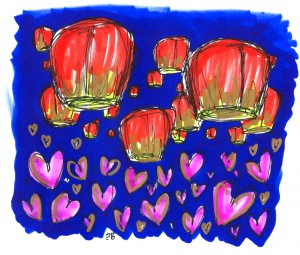 What do sweet dumplings have to do with Valentine’s Day? Well, this traditional Chinese holiday treat may not typically have a connection to the American day of love, but this year, with the Chinese Lantern Festival falling on “V Day,” many Chinese students have twice the reason to celebrate Feb. 14.
What do sweet dumplings have to do with Valentine’s Day? Well, this traditional Chinese holiday treat may not typically have a connection to the American day of love, but this year, with the Chinese Lantern Festival falling on “V Day,” many Chinese students have twice the reason to celebrate Feb. 14.
All traditional Chinese festivals follow the Chinese lunar calendar, which varies from the western Gregorian Calendar. This year’s holiday coincidence caused many Chinese students to rejoice that maybe this Valentine’s Day wouldn’t be a lonely one.
The Chinese Lantern Festival gets its English name from the traditional events practiced during the holiday as lanterns are hung in the street, dangling riddles for children to solve. More modern traditions are connected to the holiday include dragon and lion dances, but the day has always celebrated family much as Christmas does in America.
However, Chinese students studying in the states don’t get a three-week vacation to return home for the holiday and must spend the day an ocean away from their families. Even under such unhappy circumstances, Chinese students tend to find a way to celebrate nonetheless.
“[I] just eat sweet dumplings – what else could I do?” senior Tianyu Li said when asked about how he honors the holiday so far from home.
Graduate student Jingyuan Zhang shared that she typically celebrates with some “Tangyuan” herself on the day of The Lantern Festival. This year, however, she decided to share the love and cook sweet dumplings for all her American friends and her boss.
“It tastes like a combination of peanut butter and jello!” one friend, senior Felicia Gilels exclaimed after trying the dumplings for the first time. Junior Kwanza Warren compared the dumplings to Daifuku, a traditional Japanese snack also made from sweet rice flour that she tried while studying abroad.
While students like Li and Zhang have found the joys of celebrating the lantern festival with an American flare, other students find it hard to celebrate, noting the lack of festive atmosphere needed for the traditional holiday.
“Lantern Festival?” senior Ke Xiang asked with a reproachful tone. “I [don’t] celebrate it here.” However, she spoke with fondness for the holiday celebration back home. “I used to watch the television party for the festival with my family while I was in China and maybe had some Tangyuan.”
The prospect of celebrating the lantern festival away from China had quite a different effect on other students. Some even came to value their traditions more now that they are forced to celebrate without their families.
Senior Qinqin Wang used to not take the holiday seriously when she was with her family back in China. Since moving to the U.S, however, she has come to treasure the tradition and regrets her past indifference to the important cultural festival.
“Only loss can help people learn to cherish,” she said. “Now I spend the holiday with friends during the day and definitely have Tangyaun.” At night, she calls her parents to wish them “happy lantern festival” and catch up.
“I used to feel so sad when thinking about not being close to them on such holidays,” she said. “But now I realize that it is a painful but great lesson that enables me to treasure my time with anyone I love.”
With such tender sentiments, it seems perfect that the lantern festival and Valentine’s Day should correspond. At the end of the day, whether in China or Rochester, the Chinese Lantern Festival is as much about love as sharing in the joy of tradition. With such a perfect match, it wouldn’t be surprising if sweet dumplings started showing up on Valentines Day for many years to come.
Liu is a member of the class of 2016.


